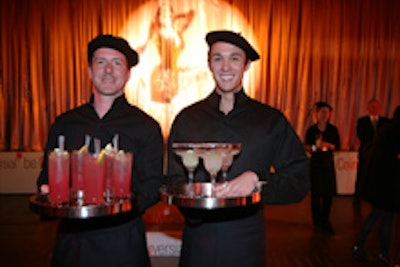
Waiters from Great Performances
Photo: Elizabeth Lippman
An event could have exquisite flowers, food prepared by a world-famous chef, and Oscar-presenter-worthy gift bags, but if a check-in person is less than friendly or the caterwaiters are standing around chatting, that’s what guests will remember. So how do you make sure service is up to par when there are so many people performing so many different tasks?
Gregory Boroff, senior vice president of external relations for the Food Bank for New York City, says a thorough interview process for volunteers is a big part of how the nonprofit keeps its quality of service (and proceeds from events) high. “We don’t send out mass emails asking who would like to volunteer for an event. Everyone is hand-picked. When people say they want to volunteer, we meet them first to see if it’s a good fit between the person and the organization,” he says. “We make sure they are friendly, that they understand what our organization is about and what we try to accomplish. Are they are there to help [us], or to further a personal agenda?” While many volunteers want to work the celebrity-studded Can-Do Awards dinner, Boroff says those jobs are often reserved for people who have proven themselves in other positions, like working in the office, or at another event.“I'm a big advocate of bringing all event staff in early for very detailed, specific training. It may cost more money, but ultimately it pays dividends well beyond the financial implications,” says Branden Chapman, vice president of production and process management for the Recording Academy. Chapman oversees hundreds of staffers at events surrounding the Grammys, including the Grammy Salute to Industry Icons, a party for the show’s performers, award winners, and music industry execs. Because of the star wattage in the room, he brings in everyone from the head of the venue to security for meetings held two months and three weeks before the event. Chapman goes over etiquette rules like not asking guests for autographs, but also defines how staffers’ roles relate to each other in order to prevent confusion and last-minute changes, which he says are the root of bad service. “[Staffers] need to understand the hierarchy of decision making. They need to know who can make a change, who can answer questions. People plan their roles in isolation unless you get everyone in the room to identify how their roles overlap,” he says.
Instructions are committed to paper at Food Bank events. Before events, the volunteer manager hands out booklets that spell out each person’s role. The volunteer manager also appoints captains to be in charge of any part of the event volunteers are involved in, from registration to greeting guests. “There should never be one person volunteers are told to go to, there should be departments within a company,” Boroff says.
At events that draw thousands of people, like festivals, it can be challenging for staffers to handle crowd control, let alone serve attendees on a personal level. Last year, more than a million people attended Luminato, Toronto’s 10-day arts and creativity festival, which features mostly free activities like concerts and dance performances. Scott Gainsburg, the festival’s visitor services and volunteer consultant, makes sure his 600 volunteers interact with as many guests as possible. “We emphasize sincerity. We want volunteers who warmly welcome and actively engage,” he says. “If they are behind a desk helping people, we want them to pretend that barrier doesn’t exist. We want them out amongst the people making sure everyone is having a good time."
It sounds like a no-brainer, but thanking staffers for a job well done is key to retaining good service. In addition to sending letters and emails, Chapman thanks staffers in front of the entire team to make an impression on everyone involved. “It’s a great motivator,” says Chapman. “If you publicly acknowledge someone in the room, [other people] will strive for the same acknowledgment in future years.”
“Just like how we wouldn’t call a donor only when we need donations, we call [volunteers] just to touch base throughout the year, and make them feel like part of the family,” Boroff says. “We email them after an event to pass along positive feedback. If we find photos from the event with them in it, we send them to them. We don’t want to let the night go by and have them not hear about it again.”
Gregory Boroff, senior vice president of external relations for the Food Bank for New York City, says a thorough interview process for volunteers is a big part of how the nonprofit keeps its quality of service (and proceeds from events) high. “We don’t send out mass emails asking who would like to volunteer for an event. Everyone is hand-picked. When people say they want to volunteer, we meet them first to see if it’s a good fit between the person and the organization,” he says. “We make sure they are friendly, that they understand what our organization is about and what we try to accomplish. Are they are there to help [us], or to further a personal agenda?” While many volunteers want to work the celebrity-studded Can-Do Awards dinner, Boroff says those jobs are often reserved for people who have proven themselves in other positions, like working in the office, or at another event.“I'm a big advocate of bringing all event staff in early for very detailed, specific training. It may cost more money, but ultimately it pays dividends well beyond the financial implications,” says Branden Chapman, vice president of production and process management for the Recording Academy. Chapman oversees hundreds of staffers at events surrounding the Grammys, including the Grammy Salute to Industry Icons, a party for the show’s performers, award winners, and music industry execs. Because of the star wattage in the room, he brings in everyone from the head of the venue to security for meetings held two months and three weeks before the event. Chapman goes over etiquette rules like not asking guests for autographs, but also defines how staffers’ roles relate to each other in order to prevent confusion and last-minute changes, which he says are the root of bad service. “[Staffers] need to understand the hierarchy of decision making. They need to know who can make a change, who can answer questions. People plan their roles in isolation unless you get everyone in the room to identify how their roles overlap,” he says.
Instructions are committed to paper at Food Bank events. Before events, the volunteer manager hands out booklets that spell out each person’s role. The volunteer manager also appoints captains to be in charge of any part of the event volunteers are involved in, from registration to greeting guests. “There should never be one person volunteers are told to go to, there should be departments within a company,” Boroff says.
At events that draw thousands of people, like festivals, it can be challenging for staffers to handle crowd control, let alone serve attendees on a personal level. Last year, more than a million people attended Luminato, Toronto’s 10-day arts and creativity festival, which features mostly free activities like concerts and dance performances. Scott Gainsburg, the festival’s visitor services and volunteer consultant, makes sure his 600 volunteers interact with as many guests as possible. “We emphasize sincerity. We want volunteers who warmly welcome and actively engage,” he says. “If they are behind a desk helping people, we want them to pretend that barrier doesn’t exist. We want them out amongst the people making sure everyone is having a good time."
It sounds like a no-brainer, but thanking staffers for a job well done is key to retaining good service. In addition to sending letters and emails, Chapman thanks staffers in front of the entire team to make an impression on everyone involved. “It’s a great motivator,” says Chapman. “If you publicly acknowledge someone in the room, [other people] will strive for the same acknowledgment in future years.”
“Just like how we wouldn’t call a donor only when we need donations, we call [volunteers] just to touch base throughout the year, and make them feel like part of the family,” Boroff says. “We email them after an event to pass along positive feedback. If we find photos from the event with them in it, we send them to them. We don’t want to let the night go by and have them not hear about it again.”



















